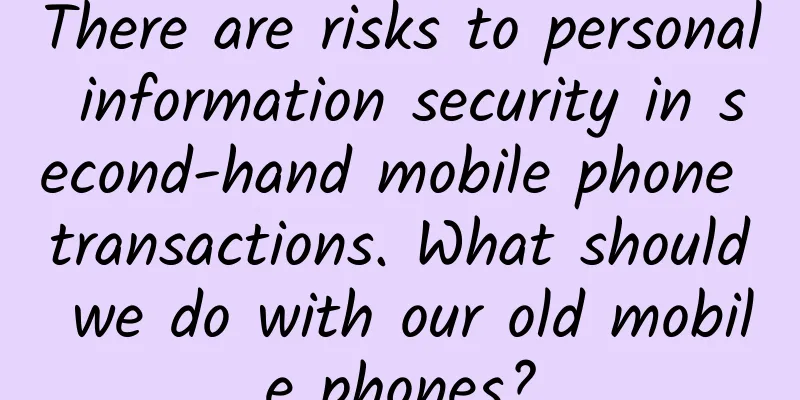There are risks to personal information security in second-hand mobile phone transactions. What should we do with our old mobile phones?

|
Recently, there has been a rumor on the Internet that there may be a risk of personal information leakage in second-hand mobile phone transactions, which has aroused widespread social concern. What are the risks of second-hand mobile phone transactions? Can personal information deleted from old mobile phones be restored? How should we properly dispose of our old mobile phones?
Leakage of personal information from second-hand mobile phones raises concernsWith simple operations, you can restore the original data of a mobile phone that has been deleted and has used the "factory reset" function built into the mobile phone. And there are businesses that specialize in this "business." Recently, news has been circulating online that the original data of second-hand mobile phones can be restored through technical means, triggering new public anxiety about information leakage caused by the recycling of second-hand mobile phones. So, is it reliable to sell your old phone after restoring it to factory settings and deleting related content and software? "The principles and rules for information storage are basically the same for traditional computers and today's smartphones. Simply restoring factory settings and deleting files does not mean that the information is completely deleted." Pei Zhiyong, a network security expert and director of the Qi'anxin Industry Security Research Center, said that when a file is "deleted" on a mobile phone, the system only deletes the path indicating the file, which means that ordinary people cannot find the file, but the actual content information is still stored inside the phone. "So, if you want to restore the previous storage content information of the mobile phone, it is possible, and the technical threshold is not high." Pei Zhiyong admitted that currently in some informal second-hand mobile phone recycling shops, some people will use this method to restore the storage information in the mobile phone, such as mobile phone contacts, text messages and other content involving personal information, and then resell them to make huge profits. Industry experts believe that currently, second-hand mobile phones have become one of the sources of personal information leakage, forming a mature gray industrial chain. The personal information obtained from them may be used for spam calls, text messages and even telecommunications fraud. How to deal with old mobile phones has become a new problem for "mobile phone users""Mobile phones are being replaced more and more frequently. I already have 7 or 8 old mobile phones at home. I don't know what to do with them after a few years, so I can only leave them there." Beijing citizen Xiao Wang said that in addition to mobile phones, she also has several old laptops and desktop computers at home, which take up a lot of space. Data released by the Ministry of Industry and Information Technology showed that my country's mobile phone production reached 210 million units in January and February 2021, a year-on-year increase of 49.2%, of which smartphone production reached 140 million units, a year-on-year increase of 48.8%. "my country is a major country in terms of smartphone usage, with a huge number of mobile phones produced and eliminated every year." Telecommunications expert Fu Liang predicts that the scale of second-hand mobile phones will continue to increase. With the rapid development of smart phones and the Internet, situations similar to Xiao Wang's will become more and more common. Some consumers even have dozens of old mobile phones at home. Most people don't quite know how to recycle and properly dispose of them, so they can only leave old mobile phones and old smart products at home to collect dust. "I feel it's a pity not to sell it, but I'm worried if I sell it." "Not only does it take up space at home, but it also doesn't make the most of the phone's residual value." "A half-used phone can be sold at a good price, but I'm worried about my personal information being leaked." The messages left by netizens on the Internet represent the voices of many consumers. With the continuous growth of the number of old mobile phones, consumers can often see slogans such as "high price for mobile phone recycling" and recycling shops on the streets and in shopping malls. However, most consumers are not familiar with the mobile phone recycling and second-hand mobile phone sales industry. When recycling old mobile phones that have been used personally, the public generally has concerns about whether it will lead to potential risks such as the leakage of their important personal information and privacy. Here comes the correct way to deal with old mobile phones"Generally, when people are about to replace their mobile phones, they will generally pay attention to reducing the use and storage of key information on the old phone. The value of the information on the old phone begins to decay over time." Fu Liang said that some APP applications, payment-related identity and other information, even if recovered by others, the probability of directly causing harm to mobile payments is relatively low. According to Fu Liang, the version upgrade and iteration speed of smart application software such as financial institutions' APP and mobile payment is relatively fast, and it is difficult to apply the user-related information recovered from second-hand mobile phones to the payment function of the new version. However, if private photos, especially important ID card and other photo data, are recovered, the hidden dangers are relatively large. Recycling and reusing obsolete electronic products is the general trend. So the question is, how can we sell and recycle our old mobile phones while ensuring information security? Pei Zhiyong suggested that, first of all, old mobile phones should be sold on large platforms and large stores as much as possible, and personal channels or small stores should be avoided as much as possible. Secondly, after replacing the old mobile phone, do not rush to sell it. Before selling, in addition to restoring the factory settings and deleting old files, you can choose to download "file shredding" software to repeatedly overwrite and copy the obsolete mobile phones and computers. "Users can connect their mobile phones to computers, delete all the contents on the phone first, and then write new large files to the phone, repeating this process several times to fill up as much space as possible." Pei Zhiyong said that this can basically ensure that the personal information and traces in the old phone are completely erased. Experts recommend that you try not to save sensitive or confidential information on your mobile phone, and that important information should be deleted as soon as possible after being saved and used. After multiple data overwrites, the chance of data recovery will be greatly reduced. Fu Liang believes that from the perspective of global environmental protection and resource recycling, the development of the recycling industry for second-hand electronic products represented by smartphones and computers is imperative. Relevant departments should study measures and regulations in advance to provide support for related recycling industries, make recycling channels more transparent, and recycling methods more scientific and accurate, so as to promote the healthy and orderly development of the industry. "Only by clarifying the professional qualification standards for recyclers and issuing more detailed regulations and measures can we consumers say 'no' to unidentified recyclers." Pei Zhiyong said that when legislating and formulating regulations, the leakage of personal information of second-hand mobile phones should be included in the overall scope of information protection, and unified planning and deployment of measures should contribute to the improvement of personal information security protection. |
>>: 6 hidden tricks of WeChat, how many have you used? Worth collecting
Recommend
Humans are omnivores, so did our ancestors eat meat or vegetables?
Should people eat more meat or more vegetables? T...
2022 new online super hit "Lao Tao Pinduoduo Operation Series Course"
2022 new online super hit "Lao Tao Pinduoduo...
How to increase website traffic? How to increase website traffic?
Increasing website traffic is the dream of every ...
2020 Beauty Industry Brand Marketing Insights Report
This article shares with you the marketing trends...
NIO co-founder: We have a good relationship with JAC, and NIO car deliveries will start soon
"NIO's delivery standards are good licen...
During the epidemic, this native rural commercial bank did these things
[51CTO.com original article] Spring has not yet a...
WeChat iOS 8.0.9 official version released: known issues resolved
[[411759]] WeChat iOS 8.0.8 official version was ...
Huawei App Market Brand Resource Bidding Promotion Process
Huawei App Market Brand Resource Bidding Promotio...
Video account batch diversion, screen domination industry keywords (basic class) comprehensive and systematic explanation of video account gameplay
Video account batch diversion, screen domination ...
Mount Emei, the other side you don’t know
Mount Emei is one of the four famous Buddhist mou...
Information flow effect is not good? Maybe you didn’t do a good job of business analysis丨Attached is the latest case study
An experienced pitcher may know how to package th...
101 years old! The world's oldest doctor reveals 5 secrets to longevity and anti-aging, which many people fail to follow
Imagine if you go to see a doctor and the doctor ...
How much does it cost to produce a short video of African mercenaries holding signs and shouting?
As the Wuhan epidemic slowly dissipates, major co...
Cool! Stunning! Chinese style! Sneak peek——
On September 22, the posters for the Beijing 2022...









